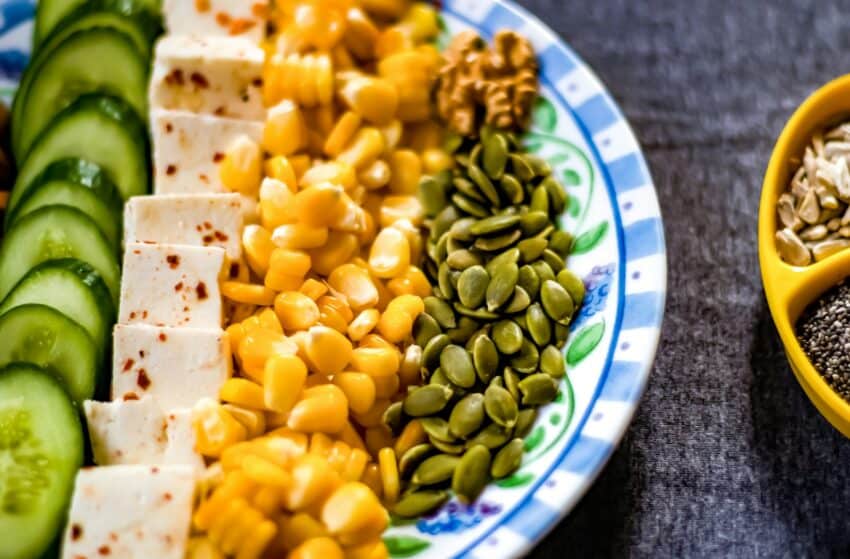If you’re on a plant-based diet and aiming for peak performance then you might wonder how to balance vegan carbs and protein to fuel your workouts and recovery. The good news is that it’s entirely achievable, and I’ll show you how.
First of all, we’ll discuss why carbs and protein matter then we will tell you how to get them from plant-based sources. Stay tuned to get amazing tips that will help you optimize your nutrition.
Why Carbs and Protein are Essential?
Carbohydrates are your body’s primary fuel source, especially during high-intensity activities. They’re broken down into glucose, which powers your muscles and keeps your energy levels steady.
On the flip side, protein plays a crucial role in muscle repair and growth. This is something that makes it essential for recovery after workouts.
It is worth mentioning that a study in Nutrients highlights that athletes on vegetarian, plant-based, and vegan vitamins can perform just as well as those on traditional diets.
Further, it added that if they consume enough carbohydrates and protein then the key is finding the right balance. As a result, they focused on and chose nutrient-dense options.
What are Vegan Carbs and Protein?
Carbs and protein aren’t just about numbers—they’re about quality. Vegan carbs and protein come from plant-based foods that offer more than just macronutrients. They’re often packed with fiber, vitamins, and minerals that enhance overall health.
Let’s break them down.
Best Vegan Carb Sources for Energy
All of these are some of the best carb sources for energy. So, you can add to your diet to energize your body.
Whole Grains: Brown rice, quinoa, and oats provide complex carbs that release energy slowly. For example, one cup of cooked quinoa offers 39 grams of carbs along with 8 grams of protein—a great double-duty food.
Legumes: Lentils and beans are not just high in carbs but also rich in protein and fiber. A cup of cooked lentils provides about 40 grams of carbs and 18 grams of protein.
Starchy Vegetables: Sweet potatoes and butternut squash are fantastic carb sources, loaded with vitamins and antioxidants.
Top Sources of Protein in a Plant-Based Diet
You can add these as one of the best protein sources for proper nourishment of your body. Let’s have a look.
Tofu and Tempeh: These soy-based staples are incredibly versatile. Tempeh, for example, provides 31 grams of protein per cup.
Legumes: Chickpeas, black beans, and kidney beans are protein powerhouses. Combine them with rice for a complete protein profile.
Plant-Based Protein Powders: If convenience is your goal, these are perfect. One of the best products is Warrior Blend Organic Protein Powder, which can provide all the protein your body needs. It’s made from pea, hemp, and goji berry proteins—easy to digest and highly effective for recovery.
The Science of Balancing Carbs and Protein
For peak performance, research recommends a 3:1 or 4:1 ratio of carbs to protein after intense workouts. This ratio helps replenish glycogen stores and speeds up muscle recovery.
For example, after a long run, you might pair a banana (27 grams of carbs) with a scoop of plant-based protein powder (20 grams of protein) blended into a smoothie.
Timing Your Nutrients
When and how you eat carbs and protein matters just as much as what you eat.
Before Exercise: Eat a carb-rich meal 2-3 hours before exercising. This will help you to ensure sustained energy. You can take oatmeal with fruit or a quinoa salad as both of them works well.
After Exercise: Focus on combining carbs and protein within 30 minutes of finishing your workout. This is when your body absorbs nutrients most effectively for recovery.
Interesting Facts to Inspire You
Do you know carbs boost protein effectiveness? Yes – it is true because it is said that if someone eats carbs with protein then it triggers an insulin response. This will help you to shuttle amino acids into your muscles faster.
Another fact that is important to mention here is that legumes are one of the unsung heroes. Do you know why they are called unsung heroes?
This is because of the reason legumes like lentils and chickpeas are not just high in protein—they also contain lysine. Keep in mind it is an essential amino acid often that is missing in plant-based diets.
Gut health matters. It is worth mentioning that the fiber in vegan carbs and protein sources supports gut health. Remember it is good for your health as it is essential for nutrient absorption and energy levels.
Must Try Easy Recipes For Balance
Try out these amazing recipes that combine both carbs and protein in the perfect amount to fill you with energy.
Quinoa Power Bowl: You can use cooked quinoa in it. All you need to do is to top it with black beans, roasted sweet potatoes, avocado, and tahini dressing. This meal provides a balanced mix of vegan carbs and protein.
Post-Workout Smoothie: Blend a banana, almond milk, oats, and a scoop of Warrior Blend Organic Protein Powder. This will be used perfectly as a recovery shake that’s both delicious and effective.
Final Thoughts
The balance of vegan carbs and protein in your diet doesn’t have to be complicated. All you need to do is to choose nutrient-rich foods with a full focus on timing. This is something you can fuel your body for peak performance on a plant-based diet.
Remember, consistency is key. So, try to be consistent in your efforts to achieve long-lasting goals to feel energized. This is what you need now to achieve your fitness goals with the perks of a plant-based lifestyle.



